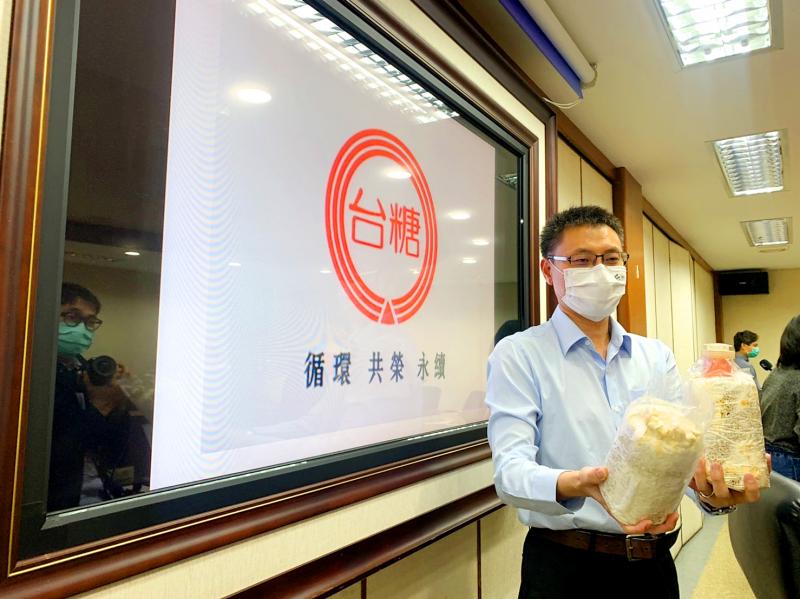Taiwan Sugar Corp (Taisugar, 台糖) is seeking to expand its award-winning program that turns sugarcane waste into mushroom cultivation packs, the state-run company said.
The company yearly turns 400 tonnes of sugarcane byproduct into cultivation packs, Taisugar said at a news conference in Taipei on Thursday.
The packs contain 50 percent sugarcane waste and 50 percent sawdust, which the company determined to be the “optimal” ratio after experiments, it said, adding that the packs are then “rented” to mushroom farmers.

Photo: Lin Jing-hua, Taipei Times
“The reason we say ‘rent’ rather than sell is because we take back the used packs at the end of the harvest cycle,” Taisugar circular economy head Jan Chang (張建成) said. “We then further compost the used packs with other materials and sell it as compost.”
“This brings additional profit to Taisugar and ensures the packs are not irresponsibly disposed of,” he said, adding that some unscrupulous farmers dump used packs irresponsibly.
“We are trying to create a closed circle,” he said.
Farmers receive a double benefit from the program, as sugarcane waste is supplied to them at NT$2.5 per kilogram compared with about NT$3.4 for hardwood sawdust, which is usually used for growing king oyster mushrooms.
They also receive a 20 to 30 percent boost in yield compared with using pure sawdust, Taisugar said.
The company produces 50,000 tonnes of sugar per year, resulting in 130,000 to 150,000 tonnes of sugarcane waste. About 70 percent of the waste is burnt to generate electricity and the rest are composted, leaving room for growth in the cultivation pack program.
“There’s definitely demand for more from farmers,” Chang said.
Taisugar is working on different ways to expand the program, including cultivation packs with a higher percentage of sugarcane waste and recycling the plastic bags that hold the substrate.
“The technology is there to recycle the plastic bags used to make the cultivation packs, but we are still working on the economic feasibility,” Chang said.
While cane sugar once played a vital role in the growth of the nation’s economy, acreages have been declining as the cost of producing sugar has increased compared with imported sugar.
“We cannot compete on price with a country like Brazil with huge farms that allow for mechanized harvesting, but sugar is a necessity and we will keep some domestic production for food security reasons,” Taisugar secretariat director Hsiao Kuang-hung (蕭光宏) said.
The company’s cultivation pack program has won top honors in the “innovative service” category of the Taiwan Circular Economy Awards last month.
However, the program itself dates back to 2014.
“Before the circular economy became a buzzword, Taisugar has been working on minimizing our environmental impact and maximizing our resources,” Hsiao said.

Taiwan will prioritize the development of silicon photonics by taking advantage of its strength in the semiconductor industry to build another shield to protect the local economy, National Development Council (NDC) Minister Paul Liu (劉鏡清) said yesterday. Speaking at a meeting of the legislature’s Economics Committee, Liu said Taiwan already has the artificial intelligence (AI) industry as a shield, after the semiconductor industry, to safeguard the country, and is looking at new unique fields to build more economic shields. While Taiwan will further strengthen its existing shields, over the longer term, the country is determined to focus on such potential segments as

UNCERTAINTY: Innolux activated a stringent supply chain management mechanism, as it did during the COVID-19 pandemic, to ensure optimal inventory levels for customers Flat-panel display makers AUO Corp (友達) and Innolux Corp (群創) yesterday said that about 12 to 20 percent of their display business is at risk of potential US tariffs and that they would relocate production or shipment destinations to mitigate the levies’ effects. US tariffs would have a direct impact of US$200 million on AUO’s revenue, company chairman Paul Peng (彭雙浪) told reporters on the sidelines of the Touch Taiwan trade show in Taipei yesterday. That would make up about 12 percent of the company’s overall revenue. To cope with the tariff uncertainty, AUO plans to allocate its production to manufacturing facilities in

COLLABORATION: Given Taiwan’s key position in global supply chains, the US firm is discussing strategies with local partners and clients to deal with global uncertainties Advanced Micro Devices Inc (AMD) yesterday said it is meeting with local ecosystem partners, including Taiwan Semiconductor Manufacturing Co (TSMC, 台積電), to discuss strategies, including long-term manufacturing, to navigate uncertainties such as US tariffs, as Taiwan occupies an important position in global supply chains. AMD chief executive officer Lisa Su (蘇姿丰) told reporters that Taiwan is an important part of the chip designer’s ecosystem and she is discussing with partners and customers in Taiwan to forge strong collaborations on different areas during this critical period. AMD has just become the first artificial-intelligence (AI) server chip customer of TSMC to utilize its advanced

Chizuko Kimura has become the first female sushi chef in the world to win a Michelin star, fulfilling a promise she made to her dying husband to continue his legacy. The 54-year-old Japanese chef regained the Michelin star her late husband, Shunei Kimura, won three years ago for their Sushi Shunei restaurant in Paris. For Shunei Kimura, the star was a dream come true. However, the joy was short-lived. He died from cancer just three months later in June 2022. He was 65. The following year, the restaurant in the heart of Montmartre lost its star rating. Chizuko Kimura insisted that the new star is still down